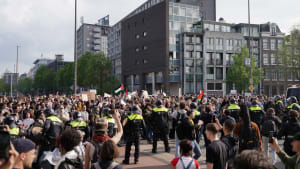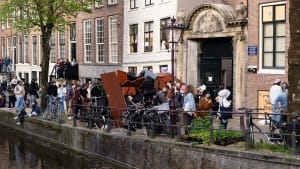
The year 2024: a year full of turmoil at the UvA
The year 2024 was a year full of turmoil at the UvA. It was the year of protests and demonstrations around the war in Gaza, but also the year of announced government cuts on education and science and a new internationalisation act. It all had tremendous impact on the mood of the UvA and her stakeholders. Below a selection of our best read pieces of the past year.
A turbulent year for universities, and therefore also the UvA. The university was the battleground of protests in early 2024. On several campuses, pro-Palestine protesters clashed several times with the Executive Board regarding collaborations with Israeli universities and the heavy-handed way demonstrations were responded to.
The new internationalisation act, which should allow for better management of the arrival of international students, also caused a stir at both the UvA and other universities. What does this mean for certain disciplines and for UvA’s position in science?
Finally, an uneasy storm raged in the country after the elections, when the new government announced its intention to cut a billion from higher education. These were now partially reversed at the end of the year, but discontent remains.
1. Termination of demonstration: 36 people arrested, 5 officers injured
In May, the UvA became the scene of several protests. The protesters demanded that the UvA sever ties with Israel and that the administration speak out about the situation in Gaza. Tents were set up and the protesters prepared for a prolonged protest. The UvA in turn asked those present to leave several times. When this was not heeded, the protest camp was cleared by the riot police at three o’clock in the morning after consultations between the police, the public prosecution and the municipality.
2. UvA administrators crack down on Dijkgraaf's internationalisation bill
The year 2024 was also the year of the Internationalisation Act, through which the government wants to direct the arrival of internationals to the Netherlands more. Former minister Robbert Dijkgraaf’s proposal met with a lot of resistance. Also at the UvA, where previously the alarm bells had been rung about the heavy growth in the number of international students. Former Board president Geert ten Dam and rector magnificus Peter-Paul Verbeek did not agree with Dijkgraaf’s proposal in anyway. Meanwhile, minister Eppo Bruins, Dijkgraaf's successor, tightened the law even further.
3. Central Student Council withdraws confidence in UvA administration
The aftermath of the demonstrations in May resonated for quite some time. For instance, the Central Student Council decided to withdraw its trust in the Executive Board and demanded its resignation ‘in the strongest terms’. The CSR said it was ‘deeply shocked’ by the events at the REC and at the Binnengasthuisterrein since last Monday, 6 May. “We strongly condemn the police violence that has been used to suppress protests and we support the protesters’ demands,” the council said.
4. Department manager UvA participated in the Bachelor
The television programme The Bachelor, where singles compete for one or more coveted bachelor(s), had a special candidate this year: UvA department manager Maud Sellis. She worked in the department of geography, planning and international development studies (GPO) and interdisciplinary social science (ISW), where she oversaw departmental finances and was in charge of hiring support staff, among other things.
Maud’s story ends with a black edge. In the interview with Folia, she already told how she was cured of breast cancer and this very thing persuaded her to join a television programme like The Bachelor. Sadly, the cancer turned out to be back this year, this time with no chance of a cure. Maud opted for euthanasia at the age of 33.
5. UvA budget 2025: red figures everywhere
In October, the UvA’s draft budget for 2025 came out. It was quite a shock: almost all faculties and departments ended up in the red. In 2028, the reduction in the number of internationals alone will cost the UvA EUR 20.5 million. Broadly speaking, most of the government cuts will only have an effect from 2026 onwards, but the start-up and incentive grants - €36.2 million UvA-wide - will already expire next financial year. All faculties and departments shall be asked to make new multi-year plans in the coming period. “We are embarking on a difficult time,” said Erik Boels, UvA director of finance.
6. Disappearing start-up grants: university teachers back to square one
One of the cuts the new government wanted to make was about scrapping the start-up grants. These had been introduced not so long ago to reduce the workload for young scientists at the highly competitive university. Thanks to the start-up grants, research groups could thus be replenished with PhD students and university lecturers were given a stepping stone to set up their own research groups. Previously, this was only possible with a grant from science financier NWO or EU funds, but there the application pressure is high and success rates are low. However, before the start-up grants could get off to a good start, they have already been dropped.
7. Demonstration in Utrecht against budget cuts will not go ahead
Long preparations were under way for the demonstration that should have been the biggest ever: the protest against education cuts on 14 November in Utrecht. But in the nick of time, Mayor Dijksma decided to cancel the demonstration on the advice of the Utrecht police and public prosecutor. There were fears for the safety of protesters after a pro-Palestinian organisation announced it would “hijack” the demonstration. WOinAction finds “the cancellation incomprehensible”.
8. UvA adopts sweeping poster policy on demonstrations
Domestically, the UvA was criticised for being too harsh during demonstrations last year. Somewhat ironically, associate professor Candida Leone finds that posters were also removed at the UvA calling for demonstrations against cuts in higher education. “The administration now sees its own rules getting in the way of advertising a protest it supports.”
9. “Discrimination against Asian Dutch is still seen as joke”
A study in 2024 found that over one in three Dutch people with an Asian background regularly experience discrimination, due to words like “spring roll”, “sambal”, or “corona” being hurled at their heads. What is the situation like at the UvA? Do Dutch students with Asian roots experience similar forms of discrimination? Folia went on campus to ask them.
10. UvA student Solin Wanders sometimes lives in nature for days: “There is too much to eat”
Folia likes to end the year on a small, positive note. Our nature series was well received and eagerly read. The first part follows biology student Solin Wanders, who scavenges food in nature. Sometimes he spends weeks at a time in the woods and at least once a week he picks his food in the wild. Already at 14, the young survival expert went into the forest with his friends for weeks at a time, without any tools (such as a phone or compass), except for a pan and a single bowl of peanuts.





.jpg)





